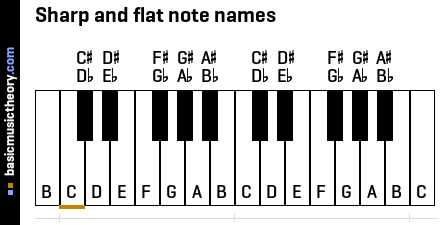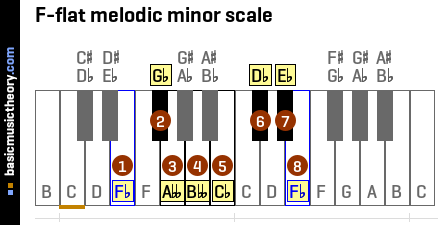F-flat melodic minor key signature
The Solution below shows the Fb melodic minor key signature on the treble clef and bass clef.
The Lesson steps then explain how to write the key signature using both clefs, including the display order and line / space staff positions of the notes, and the sharp / flat accidentals.
For a quick summary of this topic, have a look at Key signature.
| Key | C | C# | Db | D | D# | Eb | E | E# | [Fb] | F | F# | Gb | G | G# | Ab | A | A# | Bb | B | B# | Cb | All On 1 page |
|---|
Solution
1. F-flat melodic minor key signature
The F-flat melodic minor scale has 2 double-flats, 5 flats.
| No. | 1 | 2 | 3 | 4 | 5 | 6 | 7 | 8 |
|---|---|---|---|---|---|---|---|---|
| Note | Fb | Gb | Abb | Bbb | Cb | Db | Eb | Fb |
Warning: The F-flat key is a theoretical melodic minor scale key.
This means:
> Its key signature would contain either double-sharps or double flats.
> It is rarely used in practice, because it is too complex to use.
> It is not shown as a minor key on the Circle of fifths diagram, which contains the most commonly used minor keys.
> There is always an identical melodic minor scale that you can use in its place, which is on the Circle of 5ths.
> The E melodic minor scale sounds the same / contains the same note pitches, which are played in the same order, and so it can be used as a direct replacement for the F-flat melodic minor scale.
| No. | 1 | 2 | 3 | 4 | 5 | 6 | 7 | 8 |
|---|---|---|---|---|---|---|---|---|
| Note | E | F# | G | A | B | C# | D# | E |
These note names are shown below on the treble clef followed by the bass clef.
Rather than use a key signature that would in theory contain double sharps or flats, usually the key signature of the replacement minor scale E, above is used, as shown below.


| Bass Clef: | Midi | MP3 | Treble Clef: | Midi | MP3 |
Lesson steps
1. Piano key note names
The white keys are named using the alphabetic letters A, B, C, D, E, F, and G, which is a pattern that repeats up the piano keyboard.
Every white or black key could have a flat(b) or sharp(#) accidental name, depending on how that note is used. In a later step, if sharp or flat notes are used, the exact accidental names will be chosen.

The audio files below play every note shown on the piano above, so middle C (marked with an orange line at the bottom) is the 2nd note heard.
| Bass Clef: | Midi | MP3 | Treble Clef: | Midi | MP3 |
2. F-flat melodic minor notes
The Fb melodic minor scale has 2 double-flats, 5 flats.
To understand why the F-flat melodic minor scale has 2 double-flats, 5 flats, have a look at the Fb melodic minor scale page, which shows how to identify the note positions and names for this scale.
| No. | 1 | 2 | 3 | 4 | 5 | 6 | 7 | 8 |
|---|---|---|---|---|---|---|---|---|
| Note | Fb | Gb | Abb | Bbb | Cb | Db | Eb | Fb |

This melodic minor scale is based a natural minor scale that is not on the circle of 5ths - Fb natural minor scale, which means that its key signature would have double sharps or flats.
So rather than use this complex key signature, usually the key signature of a simpler equivalent scale would be used.
In ths case, the melodic minor scale having the same note pitches played in the same order is the E melodic minor scale, so its key signature will be used instead below.
E melodic minor scale.
| No. | 1 | 2 | 3 | 4 | 5 | 6 | 7 | 8 |
|---|---|---|---|---|---|---|---|---|
| Note | E | F# | G | A | B | C# | D# | E |
The next step will show the E natural minor key signature as a basis for calculating this melodic minor key signature.
| Bass Clef: | Midi | MP3 | Treble Clef: | Midi | MP3 |
3. E minor key signature
The E natural minor key signature has 1 sharp, which is different to the melodic minor scale above.
| No. | 1 | 2 | 3 | 4 | 5 | 6 | 7 | 8 |
|---|---|---|---|---|---|---|---|---|
| Note | E | F# | G | A | B | C | D | E |


To calculate the E melodic minor scale from the E natural minor scale, the 6th and 7th notes position of the natural minor scale - notes C and D are both raised by one half-tone / semitone, as shown in the next step.
However, the melodic minor key signature next to the bass or treble clef will not reflect this raised note, as explained in the next step.
| Bass Clef: | Midi | MP3 | Treble Clef: | Midi | MP3 |
4. E melodic minor key signature adjustments
Below is a table showing the note name adjustments that describe the difference between this melodic scale note and the natural minor scale, whose key signature it uses.
The 6th and 7th note of the natural minor scale need to be raised by one half-tone / semitone, which will result in adjustment actions on the existing natural minor note names.
| No | Natural minor note name | melodic minor note name | Adjustment action | Adjustment name |
|---|---|---|---|---|
| 1 | E | E | None | Same |
| 2 | F# | F# | None | Same |
| 3 | G | G | None | Same |
| 4 | A | A | None | Same |
| 5 | B | B | None | Same |
| 6 | C | C# | Raised | Sharp |
| 7 | D | D# | Raised | Sharp |
| 8 | E | E | None | Same |


The natural minor key signature of the bass or treble clef is used, with the differences between the two scales shown as adjustments next to the note names on the staff, not in the key signature itself.
| Bass Clef: | Midi | MP3 | Treble Clef: | Midi | MP3 |
| Key | C | C# | Db | D | D# | Eb | E | E# | [Fb] | F | F# | Gb | G | G# | Ab | A | A# | Bb | B | B# | Cb | All On 1 page |
|---|